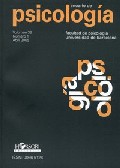Working memory, attention and compositionality
Abstract
It is standard practice in Psychology to develop microtheories to explain very specific data obtained from a reduced set of tasks. If more general theoretical constraints are disregarded, the results may be an uncontrolled proliferation of models. Discussions of which models are appropiate and which are not cause end less controversy. With a more general theory, one could put together a larger body of data (both empirical and computational) into a meaningful whole and could reject, simply and affectively, the models that do not meet the theory’s constraints. In this paper we bring together some of the existing theories on a set of processes (working memory, reasoning, visual and language processing) and a large variety of psychological, neurophysiological and computational data. We thus formulate a more general theory which, in a reasonable way, imposes a larger set of constraints on the preparation of models and challenges the validity of some inappropiate models that currently enjoy a certain prestige.Downloads
Published
2007-07-05
Issue
Section
Dossier: Forma y significado en el procesamiento del lenguaje (Coordinador: José Manuel Igoa)
License
The authors who publish in this journal agree to the following terms:
Authors transfer to the publisher all copyright for the full term of protection and for all the world.
The authors can post a copy of their articles in accordance with the policy of free access to the journal.


